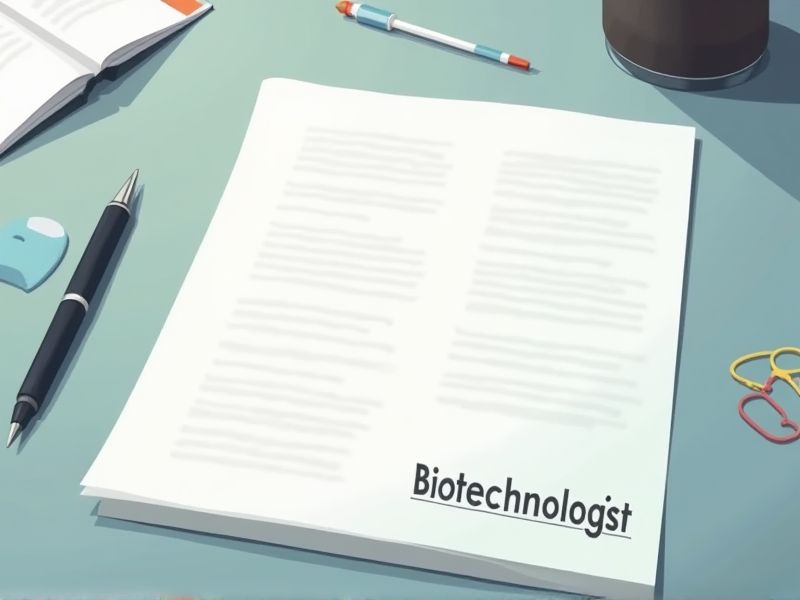
Biotechnologists operate at the intersection of biology and technology, where precision and safety are paramount due to the complexity of manipulating living organisms. Certifications equip these professionals with verified skills, ensuring compliance with industry standards and regulatory requirements. Without proper certifications, biotechnologists may struggle to gain trust and credibility in their field, which can impact job prospects and advancements. Below are essential certifications that a biotechnologist might require.
Certified Biotechnology Professional (CBP)
A Certified Biotechnology Professional (CBP) credential enhances credibility by validating an individual's expertise in the biotechnology field. This certification often leads to increased job opportunities and career advancement due to recognized proficiency. Employers tend to prefer certified professionals because they adhere to industry standards and practices. Moreover, CBP can lead to higher earning potential as it reflects a commitment to continuous learning and skill development.
Good Laboratory Practice (GLP) Certification
GLP certification ensures that biotechnologists maintain consistency and quality in their experimental processes, leading to reliable data and results. Regulatory agencies require GLP compliance for data submitted in support of product safety and efficacy, impacting drug approval processes. It enhances the credibility of research findings, facilitating smoother peer reviews and collaborations. Biotechnologists with GLP certification are better equipped to meet industry standards, increasing their employability and professional growth.
Good Manufacturing Practice (GMP) Certification
Good Manufacturing Practice (GMP) Certification is essential for biotechnologists as it ensures the consistent quality and safety of biotechnology products, which is crucial for patient and consumer protection. Regulatory compliance is a fundamental requirement for gaining market access, and GMP-certified facilities meet the standards set by authorities like the FDA and EMA. Having GMP certification enhances the credibility and reputation of biotechnologists in the industry, fostering trust among stakeholders and opening up collaboration opportunities. Due to the complex nature of biotechnological processes, GMP provides a structured framework that supports process optimization and reduces the risk of costly product recalls or legal liabilities.
Regulatory Affairs Certification (RAC)
The Regulatory Affairs Certification (RAC) helps biotechnologists understand compliance with industry regulations, ensuring their products meet safety and quality standards. It validates professionals' expertise, increasing their credibility in navigating complex regulations and facilitating product approvals. Obtaining RAC enhances career prospects by positioning individuals for roles that require regulatory knowledge. By understanding regulatory landscapes, biotechnologists contribute to faster development and market entry of biotech innovations.
Certified Quality Auditor (CQA) for Life Sciences
Certified Quality Auditors for Life Sciences ensure biotechnologists adhere to regulatory standards, directly impacting product safety and efficacy. Their expertise in quality systems auditing verifies processes, reducing errors in biotechnological applications. Biotechnologists rely on CQAs to identify compliance gaps, minimizing risks related to drug development and medical device production. The CQA's role in continuous improvement fosters innovation, essential for advancing life sciences solutions.
Certified Clinical Research Professional (CCRP)
Biotechnologists often engage in clinical trials to test new therapies or products, and thus require a detailed understanding of clinical research processes, which a Certified Clinical Research Professional (CCRP) provides. Possession of the CCRP credential can enhance a biotechnologist's credibility in managing and conducting ethically robust and compliant trials. Biotechnologists with a CCRP certification are better equipped to ensure adherence to regulatory standards, reducing the risk of errors in trial management. The CCRP establishes a professional benchmark that can improve a biotechnologist's career prospects by demonstrating expertise in clinical research methodologies.
Bioinformatics Certification
Bioinformatics certification equips biotechnologists with essential skills to analyze large-scale biological data, a necessity as genomic data becomes increasingly vast. The integration of computational tools in biotechnology accelerates research and innovation, making proficiency in bioinformatics critical. Professionals with this certification often experience enhanced job prospects and career advancement due to the growing demand for interdisciplinary expertise. Bioinformatics knowledge facilitates efficient problem-solving in complex biological systems, directly impacting research outcomes and industrial applications.
Molecular Biology Techniques Certification
Gaining a Molecular Biology Techniques Certification enables biotechnologists to enhance their technical skills and remain competitive in a rapidly advancing field. As biotechnology projects increasingly rely on complex molecular processes, a certification provides the necessary expertise to navigate cutting-edge technologies. Employers often seek certified individuals to ensure efficiency and accuracy in lab work, reducing the risk of costly errors. Certification also demonstrates a commitment to professional development, which can help in career advancement and collaboration in multidisciplinary teams.
ISO 13485 Lead Auditor Certification
ISO 13485 Lead Auditor Certification ensures biotechnologists understand stringent regulatory requirements, thereby enhancing organizational compliance. This expertise aids in designing and maintaining quality management systems tailored for medical devices and related processes. Certification equips biotechnologists with skills to conduct thorough audits, identifying potential risks and areas for improvement. Knowledge gained from this certification enhances the credibility and reliability of biotechnological research and product development.
Laboratory Safety Certification in Biotechnology
Laboratory safety certification provides biotechnologists with essential knowledge to prevent accidents and mitigate risks associated with handling biological materials. This certification ensures adherence to industry standards, promoting a safe working environment and reducing the likelihood of contamination. It verifies that biotechnologists understand proper disposal methods for hazardous substances, safeguarding both human health and the environment. Certification aids in legal compliance, minimizing liability for organizations and supporting continuous professional development.
Summary
When you, as a biotechnologist, obtain certifications, your credibility in the industry significantly increases. Employers view certified professionals as more skilled, which can lead to better job prospects and potential salary increments. Your expertise is often recognized, opening doors for roles that require specialized knowledge. Certifications can also enhance your ability to contribute to cutting-edge research and innovations.
